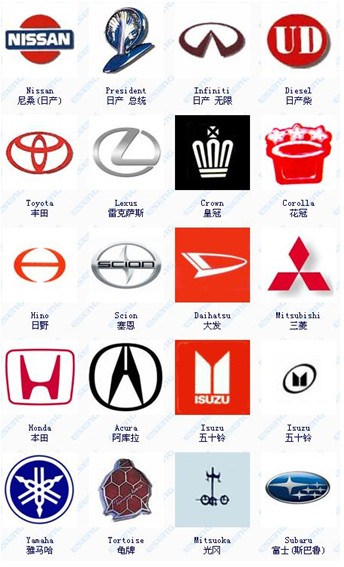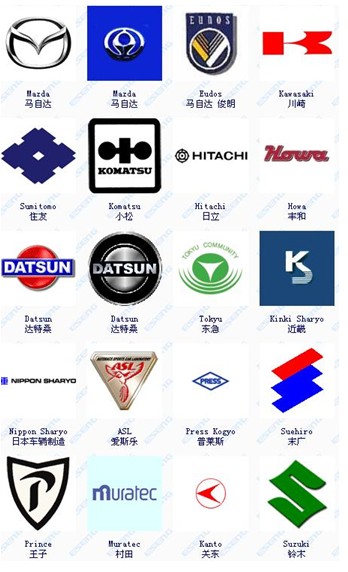文字难度:★★★☆☆
 Over the years, Japanese car names have been a source of unending comedy,1)frivolity and perplexity in international motoring circles.
Over the years, Japanese car names have been a source of unending comedy,1)frivolity and perplexity in international motoring circles.
在过去这些年里,日本车的型号名称在国际汽车界一直让人觉得可笑、轻浮又费解。
Let’s face it, many of the names that surface only in Japan are simply 2)hilarious: Note That’s Century Life Zest Move Latte; Fit Cima Every Inspire Freed Naked President Crown Odyssey. No, that’s not some new language from 3)the back of beyond, but two sentences exclusively comprised of Japanese car names.
我们来正视现实吧,许许多多只出现在日本本土的汽车名称简直让人笑破肚皮。比如说 “Note That’s Century Life Zest Move Latte(注意那是世纪生活热情行动拿铁咖啡)”、“Fit Cima Every Inspire Freed Naked President Crown Odyssey(健康的西玛每每激励释放裸体总统皇冠征程)”。别误会,这可不是来自穷乡僻壤的新语种,而是由多个日本车名组成的两个句子。
One look at such names and you feel like you are watching a badly 4)dubbed 5)martial arts movie. Remember those early Bruce Lee 6)flicks, such as 7)The Big Boss, in which the actors’ mouths seemed to move at random as the English 8)voice-over struggled to keep up? That’s the way the vast majority of Japanese car names come across—a little bit weird. It’s like you’re in a parallel universe where all the rules of language have been thrown out the window and just about anything goes.
看一眼这些名字,你就会感觉自己仿佛正在看一部翻译蹩脚的武打片。还记得李小龙早期的电影吗?比如说《唐山大兄》。在这些影片里,演员的嘴巴似乎是乱动一气,而英语配音则费力地想跟上口型变化的节奏。日本车的大部分名称也会给你同样的感觉——怪怪的。你似乎身处与现实平行的另一世界里,而在那个世界,所有的语法规则都被抛弃,怎么说都行。
So why do the Japanese use English or Latin-sounding words? One Japanese colleague says, “They sound more 9)exotic and culturally deeper than Japanese names, even if we don’t understand the actual meaning of the word.” He 10)has a point, though I think the 11)bottom line is this: The vast majority of Japanese involved in naming products just don’t really 12)give a hoot what a name means outside of Japan. As long as it looks cool, and captures the attention of domestic buyers, then that’s all that matters. The problem is, however, that many of the words just don’t make sense.
那么,为什么日本人会用英语或拉丁语发音的词给车起名字呢?我的一位日本同事说:“尽管我们并不清楚这些词的真实含义,但它们听起来富有异国情调,比日本本土的名字有更深的文化内涵。”他的话有道理,不过,我觉得关键是大部分给这些汽车命名的日本人对于这些词在日本之外会有什么含义根本不在乎。只要这些词看起来酷意十足,可以吸引国内消费者的注意力,那么其他的就都不重要了。可问题是,这些词很多都让人摸不着头脑。
Take the 13)Mitsubishi Legnum for example. To the company’s marketing types, Legnum must have sounded cool, although I can’t imagine why. When you think of it in an English context, it couldn’t be worse for a 14)sporty 15)wagon that16)purports to be a driver’s car. I mean, hey, drive it too long and you get a “leg numb”? Not good.
以三菱汽车的Legnum为例吧。对三菱的营销人员来说,Legnum听起来一定棒极了——虽然我也不明白其中的原因。可是,放在英语语境里想一下,这个名字对于一款自称能让驾驶者享受驾驶乐趣的竞赛车型旅行车来说,真是糟得不能更糟了。我是说,嘿,这车开久了,你会“腿麻”(leg numb)?太差劲了。
And what about—hang on, parents, send your kids out of the room—the 17)Daihatsu Naked? Woah! That’s like calling a car mappadaka, the Japanese equivalent of naked. Check out the little 660cc minicar’s exterior, though, and you can see where that “raw” name might have come from. The car looks like it has lost its top layer of sheet metal! In its defense, it does actually look naked.
还有呢——等等,请父母先让孩子离开一会儿——大发的Naked这个车名怎么样?哗!这就相当于把车叫作mappadaka——日语“裸体”的意思。不过呢,你得先看看这辆排量为600cc的小型汽车的外观,这样你就明白这个“坦荡荡”的名字其由来了。这款车的最上面一层车壳钣金好像不见了!我得替这个名字辩护,这车确实看似赤裸裸的。
And what about the 18)Nissan Fuga? In Japanese, it means “elegance,” while in Italian it means “escape,” two perfectly reasonable descriptions for a luxury car. In English, however, it sounds like a 19)stale mushroom.
那么那款日产制造的叫Fuga的轿车呢?在日语里,这个词是“风雅”的意思,而意大利语则是指“逃避”。用这两个词来描述一款豪华车,倒也很贴切。可是在英语里,这个词听起来就像是霉臭的蘑菇。
Toyota’s marketing 20)moguls have, over the decades, employed countless names starting with the letter “C.” Why that is so remains a mystery. One industry insider suggested that because there is no hard “C” in Japanese, it looks and sounds soft and 21)classy. So names like Carina, Corolla, Corona, Celica, Crown, Century, Curren, Cynos, Chaser, and Cresta have been used with uncommon frequency and make their impression on many thousands of Japanese buyers.
丰田汽车公司的营销大人们数十年来用了无数个以字母“C”开头的名字。其原因至今是一个不解的谜。有一位行内人士提出,可能是因为日语里“C”不发硬音,这字母看起来听起来都显得温文尔雅。结果是一连串以C开头的名字,如:Carina、Corolla、Corona、Celica、Crown、Century、Curren、 Cynos、Chaser、Cresta,这些名称异常频繁地出现,给数以千计的日本消费者留下鲜明印象。
 But nearly every carmaker in Japan is guilty of carelessly naming their products, sometimes with embarrassingly 22)sleazy results. This is where you should cover your kids’ ears or show them their favorite Disney movie again.
But nearly every carmaker in Japan is guilty of carelessly naming their products, sometimes with embarrassingly 22)sleazy results. This is where you should cover your kids’ ears or show them their favorite Disney movie again.
不过,几乎所有的日本汽车制造商都曾因轻率大意给汽车起错名字,而有时那些名字还真低俗得让人难堪。又来了,你得捂住孩子的耳朵,或者给他们放那套他们最爱的迪斯尼电影。
Take the 23)Mazda Laputa for example. Mazda’s car-naming 24)gurus thought it might be cute to name a small car after a fictional place—Laputa—from 25)Gulliver’s Travels by Jonathan Swift. But they failed to explore what such a name might mean in other languages—such as Spanish.
以马自达的Laputa为例。马自达汽车的命名专家们觉得用小说里的地名来命名小汽车很可爱,Laputa来自约翰森·斯威夫特所写的《格列佛游记》。不过,他们没有深究这个名字在其他语言(如西班牙语)里的含义。
When you consider that Spanish is spoken by well over 300 million people worldwide, making it the third-most-spoken language on the planet, might it seem a little ignorant to call a car something that means “a lady of the night”? And the fun with Spanish does not stop there. What about the Mitsubishi Pajero? Let’s just say that in Spanish, it, 26)ahem, refers to someone who is more interested—physically—in themselves than in others.
世界上有三亿多人讲西班牙语,按人数算那是世界上第三大语种,考虑到这一点,把一款汽车称为“夜女郎”(“Laputa”一词在西班牙语里的意思)是不是一件愚不可及的事?当然,西班牙语的乐趣并不限于此。那款三菱的Pajero呢?这么说吧,在西班牙语里,它嘛,指那些对自己的身体比对他人的身体更感兴趣的人。
When I heard, just over a decade ago, that Mitsubishi was going to name a car “Dingo,” I thought they were joking. They were not. I can’t believe that none of their marketing people, those responsible for naming cars, had not heard that dingo refers to an Australian dog infamous for stealing babies out of tents.
十多年前,我就听说三菱汽车要把它的一款汽车叫作Dingo,我当时以为他们是在开玩笑。谁知道他们是来真的。我无法相信那些负责给汽车起名字的营销人员竟然没有听说过“dingo”一词指的是澳大利亚一种声名狼藉的野狗,专门从帐篷里叼走婴儿。
As we have witnessed on countless occasions, and not just in the car world, Japanese companies don’t really care too much about what their product names mean overseas. As long as it sells, what’s wrong with a sports drink called Pocari Sweat or a chewing gum called Black Black? As one colleague said, “We’re not trying to sell these products overseas, so why does it matter? As long as it sounds good to us then that’s OK.”
类似的情况我们已经见识过无数次,不仅仅是在汽车界,日本公司对产品名字在海外的含意并不怎么在意。只要产品卖得好,把一款运动饮料叫作“Pocari Sweat(宝矿力水特)”(编者注:作者是因为这名字用了“Sweat <汗水>”一词而感觉怪怪的),或者给口香糖起一个名字叫“Black Black(黑黑)”又有什么关系呢?正如我的一个同事所说:“我们又不是要在国外销售这些产品,所以那有什么关系?对我们来说,只要我们觉得好听,那就行了。”
That’s fine as long as none of these names are considered culturally insensitive by overseas governments. That’s why the name Pajero became the Shogun in certain parts of Europe, and why in Australia the Subaru Legacy, which refers to an organization that cares for the widows and dependents of deceased servicemen, became Liberty.
只要这些名称不会被外国政府认为对当地文化不够尊重就没问题。这就是为什么Pajero这一名称在欧洲的一些国家改为Shogun(幕府将军);而在澳大利亚,Subaru Legacy(斯巴鲁遗产)这一名称由于与一个专门照顾寡妇和已故军人家属的组织同名而改为Liberty(自由)。
Japanese also like words ending in the letter “O” because many names, both male and female, end with that vowel. To finish a car’s name with an “O” makes it sound more familiar, cuter and more fun. So it is no coincidence that many 660cc minicars are given Italian or Latin sounding names such as Solio, Pino, Moco, Toppo, Cervo or Mira Gino.
日本人在命名时同样也喜欢以字母“O”结束,因为许多日本人的名字,不论男女,也以字母“O”结束。让汽车的名字也以字母“O”结束,让人感觉更亲切、可爱,更有意思。这也就难怪许多排量为660cc的小型汽车都以意大利语或拉丁语发音的词命名,如Solio、Pino、Moco、Toppo、Cervo、Mira Gino。
There we go again. Now I feel as though I need some English 27)subtitles to help me with those names. The trouble is that the Japanese don’t even know…
又来了。我现在觉得自己也需要看着英语字幕才能弄懂这些名字的意思。麻烦的是,甚至日本人他们自己也不懂……
1) frivolity [frI5vɒlItI] n. 轻浮
2) hilarious [hI5leErIEs] adj. 有趣的,狂欢的
3) the back of beyond 边远地区
4) dub [dQb] v. 译制
5) martial arts 武术
6) flick [flIk] n. 电影
7) The Big Boss 《唐山大兄》,1971年李小龙旅美回到香港后拍的第一部国语片。这部影片表现了另一种类型的英雄和难度更大、速度更快、也更加激动人心的武术打斗,在整个亚洲轰动一时,李小龙也因此一跃成为香港最红的影视明星。该影片取材于一个真实的故事,“唐山大兄”的真名叫郑潮安,在泰国谋生时因反抗当地恶霸压迫华侨而成就非凡,旅泰华侨都尊称他为“唐山大兄”(唐山是泰国华侨对中国的别称)
8) voice-over 画外音,旁白
9) exotic [e^5zɒtIk] adj. 异国情调的
10) have a point 有道理
11) bottom line 要点,关键之处
12) give a hoot 介意
13) Mitsubishi 日本三菱集团,日本最大的企业集团,已有一百多年历史
14) sporty [5spC:tI] adj. (汽车)竞赛车型的
15) wagon [5wA^En] n. <口> 旅行车,小型客车
16) purport [pE5pC:t] v. 声称
17) Daihatsu 日本大发汽车公司,1998年被丰田汽车集团收购
18) Nissan 日本日产汽车公司,创立于1933年,是日本第二大汽车公司、世界十大汽车公司之一
19) stale [steIl] adj. 陈腐的

